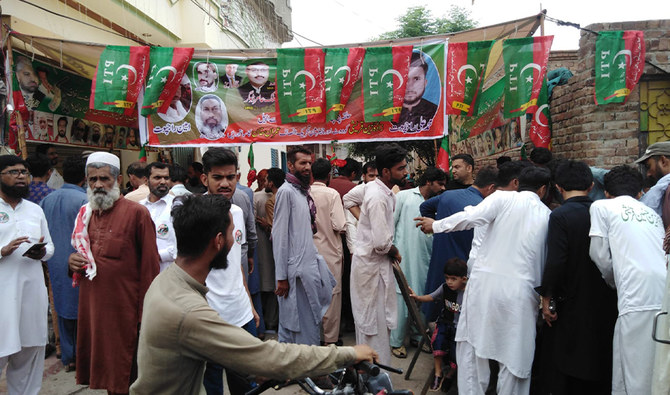Imran khan’s PTI defeated PMLN with a resounding victory by clinching 15 out of 20 seats in the Punjab by-polls, while PMLN only managed to win 4 of them. The voter turn out was around 50%, elections were held peacefully and fairly, accepted by all parties and presents hope for future democratic process in Pakistan.
PTI came into power in the aftermath of General Elections-2018, and Imran Khan became the 22nd Prime minister of the Islamic Republic of Pakistan. Everyone thought of that victory to be the long-predicted emergence of PTI and Imran Khan’s ascent to power and nobody could dare think of what would happen to be the re-emergence of PTI on the 17th of July,2022, all within the same tenure and in very unlikely of ways. This is so because politics (like history) is not a linear phenomenon but rather develops on chances and events, and one such event was Pakistan Democratic Movement’s (PDM) Vote of No Confidence (VONC) through which they ousted Khan on the 9th of April 2022, but not without Khan taking something away from it: A strong conspiracy theory of foreign interference.
A similar vote of no confidence was held in the Punjab Assembly against PTI’s provincial government as well and that succeeded too, with 25 MPAs of PTI siding with PMLN. As per Article 63(A) of the constitution of Pakistan, which provides a detailed framework on the disqualification of members on the ground of defection, those 25 MPAs were disqualified. By-Elections were called on the 17th of July 2022 for 20 seats (5 out of 25 being reserved seats) throughout Punjab as a result. PTI claimed a resounding win in the by-elections of Punjab clinching 15 seats out of 50, a province which was thought of historically as the stronghold of PMLN. This is bad optics for PMLN especially with general elections in sight. But what changed during these three months or so from 9th of April to 17th of July? Imran Khan did what he does best: selling narrative like any populist leader around the world.
PTI showed dismal performance while it lasted in power on almost every front, and especially the economic one. For many months, there was double digit inflation, the reserves were falling, the trade deficit widening, and above all, the challenge of increasing commodity prices in the global markets with oil traded above $100 per barrel. What Khan most sought was becoming its own slow death; being in government. People were largely disappointed by his govt’s performance compared to what he claimed before the elections; exactly what populists are known for!
But there was another challenge, and which is why he lost the VONC: the rising tensions with the establishment over the notification-gate. The support, which is alleged to have brought Khan to power as political leadership would call him “Selected”, was withdrawn and IK failed in his first real political test in power. But this proved to be a blessing for Khan and his party: He constructed a conspiracy theory linking it the VONC and its success being the result of U.S conspiring against his govt while referring to a diplomatic cypher by the then ambassador to the United States, Assad Majeed Khan, in which “unusual language” was used by a diplomat of the state department. Now, IK had something to sell; something that people would buy!
He resonated the conspiracy of a conspiracy against his govt relentlessly through every platform, be it social media or through his speeches in the public gathering which his party held all over Pakistan, and to great effect! PTI’s popularity has been rising ever since, and every survey showed the same. The question thus changed from “What was PTI’s performance?” to “Was there a conspiracy?”; A change, combined with Khan propagating his narrative resolutely, translated into the victory of 17th of July 2022. Even his opponents have to give credit to IK and his party for this!
But these elections were much more than just a win for PTI; it was its re-emergence; PTI connected with and mobilised people instead of relying on any “Mr. X” or “Mr. Y”; it showed that people buy into narrative which PTI has mastered through the modern and powerful tool of social media; that other parties lag way behind in this fierce battle of narrative-making; and that PMLN overtaking government and taking unpopular decisions proved too costly politically.
There is also some hope in the process: all the parties accepted the results which is rare; voter turnout of around 50% in the by-elections was a healthy leap forward in the process of democracy; people’s voices being heard, and their vote counted as their no alleged meddling; and the elections were largely peaceful. Through a central question remains: Will PTI learn a lesson and connect to and stay connected to its voter base, and people at large, or will Khan use this victory as a bargaining chip with “Mr. X” or anyone following? The history of our political parties and how they look at the power game suggest otherwise: Become ‘Their’ darling, ‘they’ bring you to power as an obedient pet, ‘they’ boot you out once you grow some fangs and then you wait for and work for being ‘their’ darling once again. The different answer to this question and rooting democracy in the will of its people will define a different political, economic, and social reality, as opposed to the one we live in.




